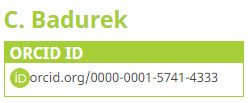Why You Need an ORCID iD: Benefits for Faculty and Student Researchers
May 5, 2017
In January 2016, eight publishers and scholarly associations signed an open letter requiring all authors submitting papers to their journals to provide an ORCID iD. By the end of the year, 17 other publishers had signed the letter, with two more signing on in March 2017. 
As more publishers require authors to have ORCID iDs in order to publish, it becomes more important for researchers to register for an iD themselves. At the Libraries we want to be sure the Drexel community understands what the open letter means for them, so we sat down with Drexel's Data Services Librarian Chris Badurek to find out more about ORCID iDs, how they help researchers navigate scholarly communications, and what to expect for the future. Others may find the Drexel Libraries response to this trend in publishing helpful in planning their own work.
Q: What are ORCID iDs?
CB: An ORCID iD (Open Researcher and Contributor iD) is a unique, digital identifier that distinguishes you from every other researcher out there. These iDs link you and your scholarly activities - like published articles or dissertations, patents, artistic performances and even data sets. They also ensure you're not being confused with someone else who might have the same (or a very similar) name and also keep you connected to your work regardless of events like name changes or changes to your organizational affiliation.
Q: Can you tell me about your own experiences with ORCID?
CB: I've had an ORCID iD for a few years now, and it is often required when publishing. Once you have one, it makes linking to your past and recent work really simple. I've heard the same feedback from Drexel faculty and grad students. Particularly now, as we see many of the top publishers like SpringerNature and PLOS and the Royal Society of Chemistry who put out the top journals require the ORCID ID - it's easier to get researchers interested and motivated to register.
Q: Are Drexel researchers expected to have ORCID iDs?
CB: ORCID has been around for more than five years now, and many of the major professional organizations, universities, government organizations and other research-funding bodies support the use of ORCID iDs. Drexel Libraries supports the publishing recommendations and advocates that all Drexel faculty and staff researchers register for an ORCID iD.
We recently urged the Graduate School to disseminate a recommendation that all doctoral and research masters graduate students register for an ORCID iD as soon as they start their program. We want our graduate students - as well as our faculty and staff -- to be well-prepared for publishing their work and to be sure they're getting recognition for their scholarly output. Plus, when members of the Drexel community have ORCID iDs, it makes it easier to identify University-affiliated research and acknowledge Drexel authors.
Q: Are there common questions or concerns you hear when you're talking with students and researchers about ORCID?
CB: The number one question I hear from grad students is 'Why register as a grad student? Won't I need a new one after I graduate?' Absolutely not! That's one of the huge benefits to ORCID iDs - they follow you throughout your entire career. You keep the same ID, regardless of any other changes in your research or personal life. That's really the greatest benefit of taking time to register with ORCID--only once, better early, but anytime during your career.
Q: Do you expect to see more publishers sign the open letter and what sort of challenges or opportunities does this present for scholarly communications?
CB: Absolutely. I think the future of scholarly communications will really be based on ORCID iDs. I think more publishers will require ORCID iDs leading to an increase in the number of ORCID registrations across disciplines. ORCID is also developing a peer review recognition system, which would be a great service to researchers who are active in the peer review process. This would basically connect individual researchers with their peer review activity, rewarding them for their often time-consuming and non-compensated contribution to the process of scholarly communication. It's also great for building up and creating trusted networks of researchers.
Q: Where can the Drexel University community find out more about ORCID iDs?
CB: I definitely recommend visiting the ORCID library guide: http://libguides.library.drexel.edu/orcid, or visiting the ORCID website at https://orcid.org/. And of course our liaison librarians are always happy to answer any questions about ORCID iDs or talk through the steps to creating an account. It's free to register and anyone can do so, whether or not they're employed or enrolled at Drexel.